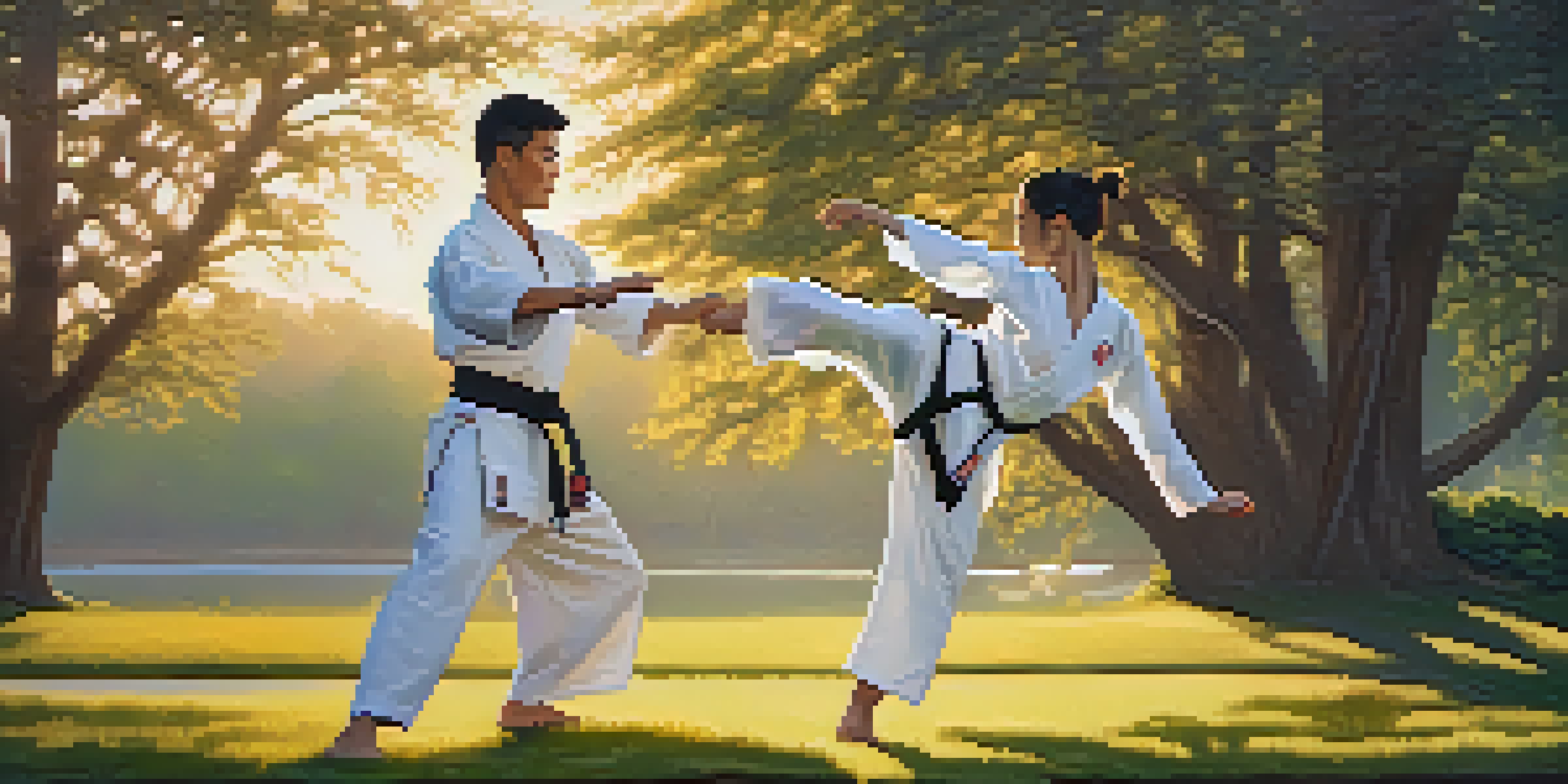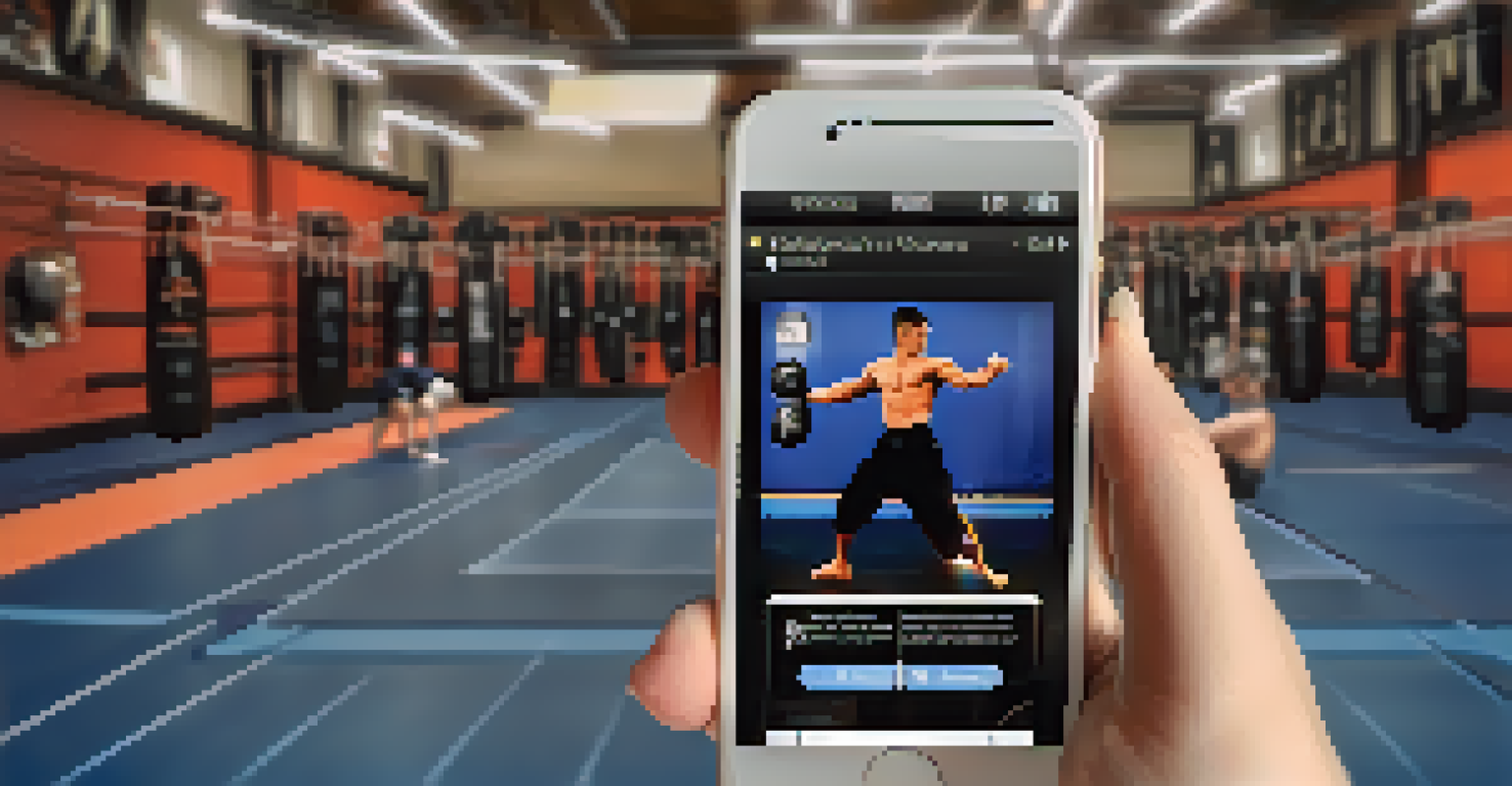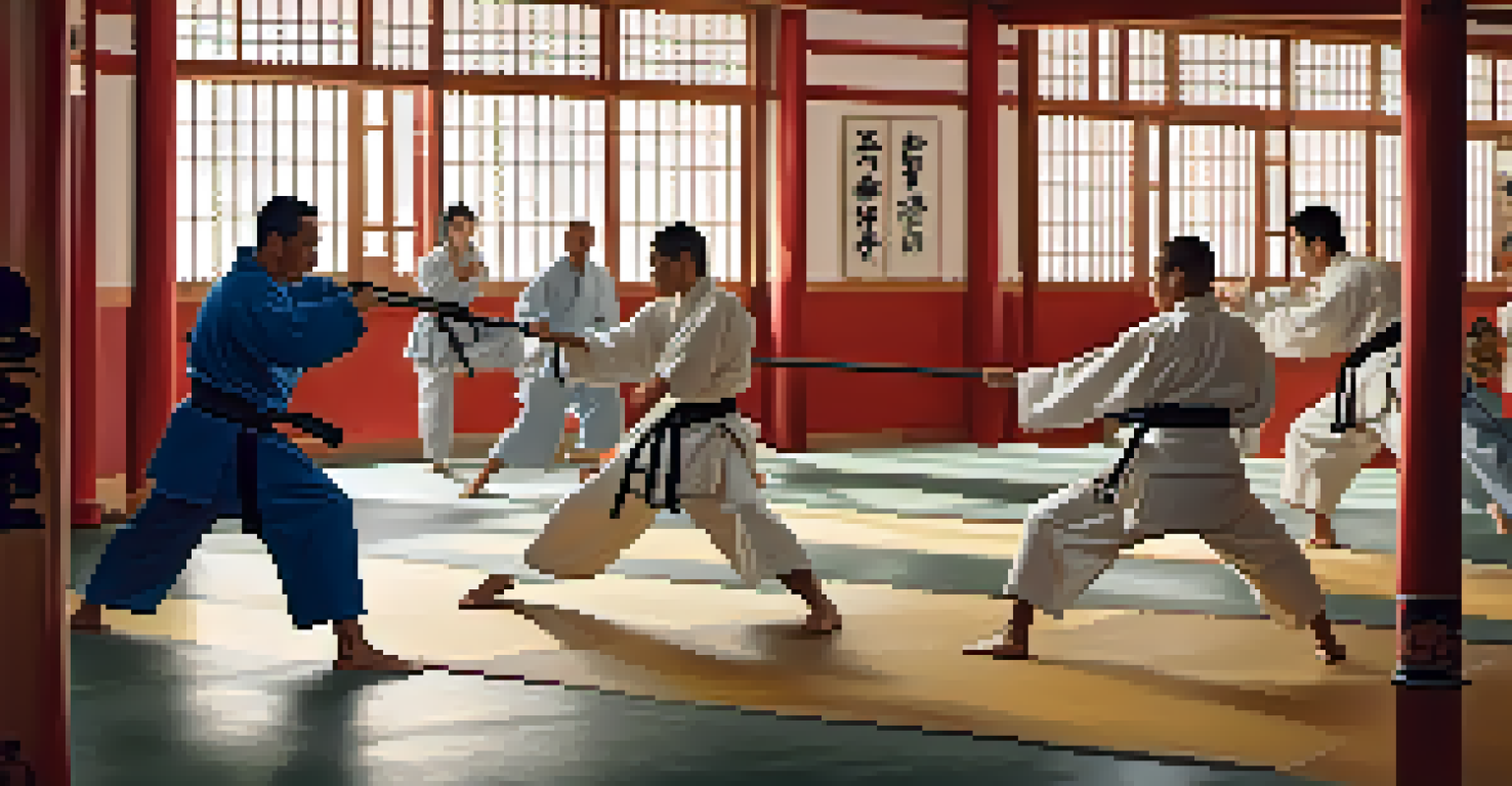Integrating Apps for Better Martial Arts Training Experiences

Understanding the Role of Technology in Martial Arts
In today's fast-paced world, technology plays a crucial role in enhancing various activities, including martial arts. By integrating apps into training routines, practitioners can streamline their preparation and improve performance. These digital tools not only provide valuable resources but also foster community and motivation among martial artists.
Technology is best when it brings people together.
Imagine having a personal coach available at your fingertips, ready to guide you through techniques or warm-ups anytime. Apps can serve this purpose, offering instructional videos, training logs, and even virtual sparring partners. This accessibility makes it easier for martial artists to engage with their training and stay committed to their goals.
Moreover, technology allows for real-time feedback and progress tracking, which are essential for skill development. With wearables and fitness trackers, individuals can monitor their heart rate, calories burned, and even technique efficiency. This data-driven approach empowers practitioners to make informed decisions about their training routines.
Popular Apps for Martial Arts Training
There are numerous apps specifically designed to enhance martial arts training, each catering to different needs. For instance, apps like 'Martial Arts Timer' help with interval training and sparring rounds, ensuring that practitioners maximize their time on the mat. Others, such as 'MyFitnessPal,' allow users to track their nutrition, which is essential for maintaining energy levels and overall health.

Another popular option is 'FightCamp,' which offers a unique blend of boxing workouts and video training. Users can follow along with professional trainers while engaging in high-intensity workouts that improve both skill and fitness. This interactive experience keeps training fresh and exciting, appealing to a wide range of martial artists.
Tech Enhances Martial Arts Training
Integrating apps into martial arts training improves performance, provides resources, and fosters community among practitioners.
Additionally, community-driven apps like 'Strava' allow martial artists to connect with others, share their progress, and even compete in challenges. This sense of belonging can be incredibly motivating, encouraging members to push their limits and achieve their training goals together.
Using Apps to Set and Track Goals
Setting clear, achievable goals is vital for any martial artist, and apps can facilitate this process. Many training apps include goal-setting features, allowing users to define their targets and monitor their progress over time. Whether it’s mastering a new technique or improving flexibility, having a structured plan makes it easier to stay focused.
The future is already here — it's just not very evenly distributed.
For example, an app like 'TrainingPeaks' allows users to create customized training plans tailored to their specific martial arts discipline. This personalized approach ensures that practitioners are working towards goals that align with their unique needs and timelines. Plus, tracking progress becomes much simpler with visual representations of achievements.
Moreover, celebrating milestones within the app can boost motivation significantly. Users can receive notifications or badges for completing training sessions or reaching specific goals, which adds a gamified element to the training experience. This positive reinforcement helps maintain enthusiasm and encourages consistent effort.
Enhancing Technique with Video Analysis Tools
One of the standout features of many martial arts training apps is the ability to perform video analysis. Practitioners can record their sessions and review their techniques, identifying areas for improvement. This self-assessment can be invaluable, as seeing oneself in action often reveals nuances that may go unnoticed during training.
Apps like 'UFC Fit' offer video feedback, allowing users to compare their movements with those of professional fighters. This side-by-side analysis can be eye-opening, helping martial artists refine their skills and adapt their strategies. By visualizing their techniques, practitioners can make adjustments that lead to significant performance improvements.
Goal Setting Simplified with Apps
Apps facilitate clear goal setting and progress tracking, making it easier for martial artists to stay focused on their training objectives.
Additionally, sharing these videos with coaches or training partners for feedback can enhance the learning experience. Collaborative analysis allows for diverse perspectives, which can highlight strengths and weaknesses from different angles. This shared knowledge fosters a supportive training environment that encourages growth.
Building Community Through Martial Arts Apps
Martial arts often thrive on community, and apps can help cultivate this sense of belonging. Many platforms allow users to connect with fellow martial artists, share experiences, and offer encouragement. This network can be crucial for motivation, especially during challenging training periods.
Social features within apps can include forums, challenges, and local event listings, creating opportunities for practitioners to engage with one another. For example, apps like 'BJJ Fanatics' not only provide training resources but also foster discussions among users about techniques and training tips. This exchange of ideas can lead to improved skills and deeper connections.
Furthermore, participating in online challenges can inspire friendly competition, pushing individuals to step outside their comfort zones. These challenges often come with rewards or recognition, adding an exciting element that keeps practitioners engaged. Ultimately, the community aspect of martial arts apps enriches the overall training experience.
Integrating Fitness and Recovery Apps into Training
To maximize performance, martial artists must prioritize fitness and recovery alongside skill training. Fitness apps like 'Nike Training Club' offer tailored workouts that enhance strength, endurance, and flexibility, all of which are vital for martial artists. Integrating these workouts into a training regimen can lead to better results on the mat.
Additionally, recovery is an often-overlooked component of training. Apps such as 'Sleep Cycle' help users track their sleep patterns, ensuring they get the rest needed for optimal performance. Proper recovery can prevent injuries and promote longevity in training, making it essential for martial artists at all levels.
Community Building Through Apps
Martial arts apps create a sense of community, allowing practitioners to connect, share experiences, and motivate each other.
Combining fitness and recovery apps with martial arts training creates a holistic approach to performance. This synergy not only improves physical capabilities but also helps practitioners maintain a healthy mindset. By addressing all aspects of training, individuals can cultivate a more sustainable and effective practice.
The Future of Technology in Martial Arts Training
As technology continues to evolve, the potential for integrating apps into martial arts training is limitless. Future developments may include augmented reality (AR) and virtual reality (VR) experiences, allowing practitioners to train in immersive environments. This could revolutionize the way martial artists learn techniques and spar with opponents.
Moreover, advancements in artificial intelligence (AI) could lead to personalized coaching experiences tailored to each user's unique training style. Imagine an app that analyzes your movements in real-time, providing instant feedback and adjustments to optimize performance. Such innovations would enhance training efficiency and effectiveness significantly.

Ultimately, the integration of apps in martial arts is changing the landscape of training. As technology becomes more accessible and sophisticated, practitioners can expect an increasingly enriched training experience that supports their growth and development. Embracing these innovations will allow martial artists to achieve their goals more effectively than ever before.